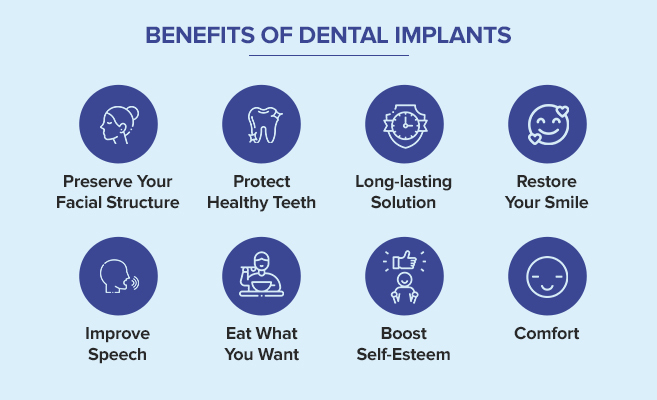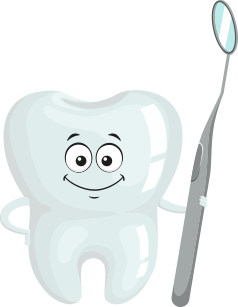Know the Benefits of Dental Implants: Say Goodbye to Missing Teeth.

Missing one or more teeth can negatively impact your quality of life. Aside from affecting your smile and self-confidence, missing teeth make chewing and speaking more difficult. Dental implants offer an effective and long-term solution to replace missing teeth. Read on to learn the many benefits of dental implants.
What are Dental Implants?
Dental implants are artificial tooth roots placed into the jawbone to hold a replacement tooth or bridge in place. The implant fuses to the jawbone in a process called osseointegration, providing a strong and stable foundation for replacement teeth.
Benefits of Dental Implants
Dental implants offer many benefits over other tooth replacement options. Here are some of the top reasons to consider dental implants:

Preserve Your Facial Structure
When you lose teeth, the surrounding bone begins to break down over time. This can change the shape of your face, making you look older. Dental implants help prevent bone loss and preserve the natural contours of your face.
Protect Healthy Teeth
Unlike bridges, which require cutting down healthy teeth, implants don’t rely on neighboring teeth for support. Implants also prevent unhealthy shifts or changes in the alignment of remaining teeth.
Long-lasting Solution
With proper care, implants can last a lifetime. While other restorations like bridges may only last 5-7 years, implants provide a durable and permanent replacement for your missing teeth.
Restore Your Smile
Implants look, feel, and function like healthy natural teeth. The crowns are custom-designed to replicate the size, shape, and color of your surrounding teeth. Implants restore the beauty of your smile.
Improve Speech
Missing teeth can cause slurred or mumbled speech. Implants allow you to speak normally again without worrying about teeth slipping or falling out.
Eat What You Want
Implants let you eat all of your favorite foods with confidence. You’ll no longer have restrictions on hard, crunchy, or chewy foods.
Boost Self-Esteem
A missing tooth can greatly lower your confidence and self-image. Implants give you back your healthy, full smile so you can smile brightly again. This does wonders for your self-esteem.
Comfort
Implants are placed directly in the jawbone like natural tooth roots, so they don’t rub, slip, or cause bone pain like removable dentures often do.
The Implant Procedure
The implant process involves a few different steps:
- Initial consultation: The dentist will assess the health of your jawbone using X-rays and scans. They will also discuss treatment goals, medical history, and timeline.
- Placement surgery: The dentist will place the implant screw(s) into precisely pre-drilled holes in the jawbone during this minor surgery. The gums are then stitched closed over the implant to allow the bone to heal and integrate with the implant surface.
- Healing time: There is a 3 to 6-month healing period to allow for full integration into the bone before a crown can restore the implant. Temporary replacement teeth may be worn during this waiting period.
- Restorative surgery: The dentist will uncover the implants and attach an abutment (connector) to the implant. An impression will be taken, and custom-made replacement crowns/teeth will be ordered.
- Crown placement: The realistic-looking crowns are secured to the implants in your mouth. Your smile is now whole again.
While the process takes a few months from start to finish, the benefits of implants make them well worth the time, cost, and adjustment period. The result is a smile that looks, functions, and feels like your teeth.
Conclusion
Implants can vastly improve your quality of life if you’re missing one, several, or all of your natural teeth. Protect your facial structure and other healthy teeth, and smile with dental implants. With good oral hygiene, your implants could last you the rest of your life.
So, if you are looking for the best dental clinic to learn more about procedures or dental implant costs in Chennai, Radiant Dental Care has your back. We are experts in tooth implant in Chennai, where you can get professional treatment with utmost precision. Book an appointment to learn more.
FAQs
What is the success rate of dental implants?
The success rate of dental implants is very high, with 95% of implants successfully integrated into the jawbone after the healing period. Dental implants can last for decades with proper placement, care, and maintenance.
Does getting an implant hurt?
Having a dental implant placed does involve some discomfort and periodontal surgery. However, most dental clinics use anesthesia so you do not feel any pain during the procedure. Some temporary soreness and swelling may occur after implant surgery, but this usually subsides with over-the-counter pain medication.
How long does it take to get dental implants?
The entire dental implant process can take 5-6 months or more since there is a vital healing time of at least 3-6 months to allow the implant to fuse to the bone properly. The exact time frame will depend on your case and your dental provider’s workflow.
Can dental implants get infected?
Yes, although dental implants have a high success rate, infections are possible in some cases. With proper at-home care and professional cleaning/maintenance, infections can usually be avoided or treated effectively with antibiotics if caught early. Let your dentist know immediately if you notice any swelling, soreness, or other issues.

 +91 9513446186
+91 9513446186
